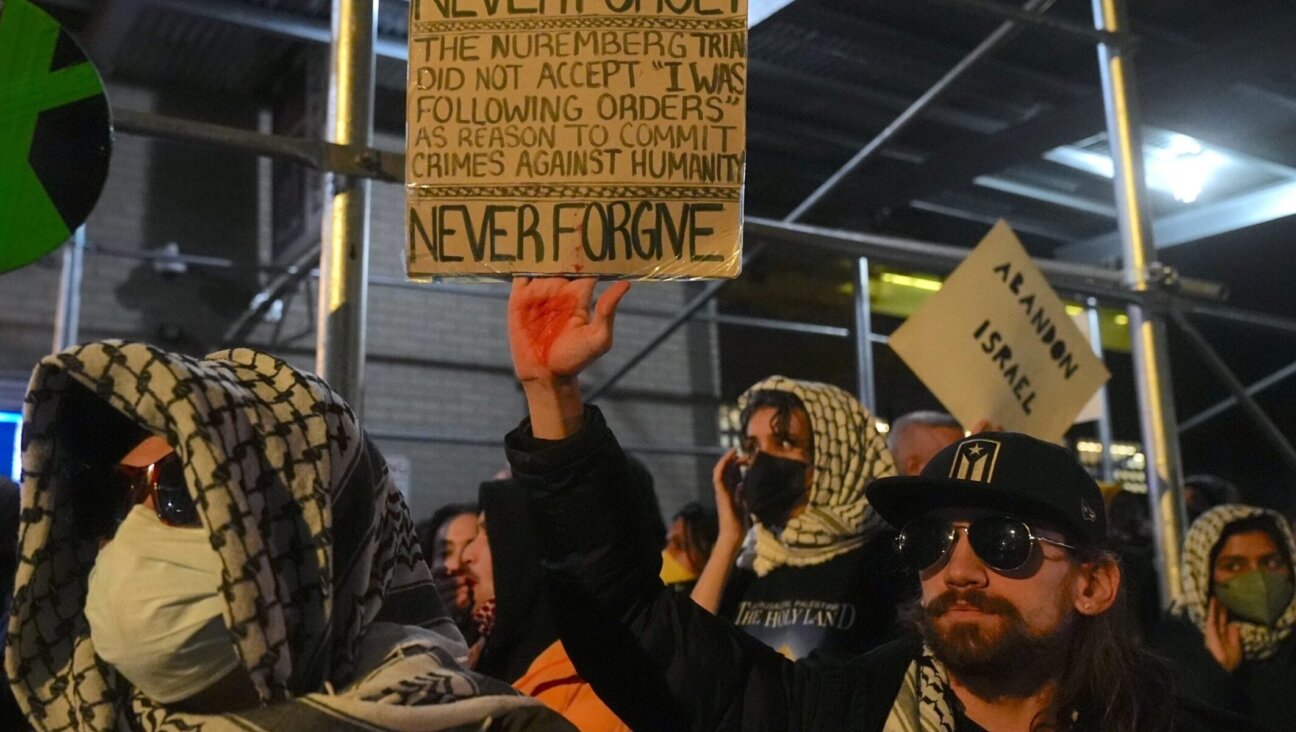Songwriter Denise Rich: ‘Inside of Me Is a Black Woman’
“Inside of me is a black woman,” declared songwriter Denise Rich, who hosted the April 2 Foundation for Ethnic Understanding’s annual spring benefit at her lavish Fifth Avenue penthouse. “It’s why I write the songs I do,” Rich told the 150 guests. “The world needs more than ever… to do something about relationships between all the races,” added Rich, the ex-wife of the controversial billionare Marc Rich. During a private conversation, Rich later told me, “On Saturday I’d go to synagogue… on Sunday to Gospel church…. God gave me the melodies.”
“In the spirit of Pesach two weeks hence,” Rabbi Arthur Schneier, president of the foundation, offered the following tale: “A youngster explained the Exodus story to his grandfather: ‘After Pharaoh chased them out, Moses called in the engineers who laid down pontoons, the air force strafed and bombed and the Egyptians drowned.’ The grandfather was appalled. Replied the boy: ‘Grandpa, if I told you the story they taught us in Hebrew school, you’d never believe it!’”
Roc-a-Fella Records founder Jay-Z, one of the hip-hop industry’s top recording artists and a recipient of the foundation’s Joseph Papp Racial Harmony Award, praised Israeli-born Lyor Cohen, president and CEO of Island Def Jam Music, who, he said, “showed me… to judge people only on their character and not the color of their skin.” Added Jay-Z, “I hope to make a lot of money with Lyor.” Barry Weiss, president of Jive Records, which is home to such mega artists as Britney Spears, *NSYNC and the Backstreet Boys, also received the Papp award. Like his father, Town Records founder Hy Weiss, Weiss said, “I’m a Jew working in a black-Jewish environment…. I realized I was not like all the other kids when, at my 1972 bar mitzvah in Shelter Rock [Long Island] one of the guests was Nipsey Russell.”
“Under the leadership of Rabbi Schneier, the foundation has entered into the Latin-Jewish” arena, said Lawrence Kopp, the foundation’s executive director. In June the foundation will open its Washington office to work with Jewish, Hispanic, black and Asian-Pacific congressional ethnic delegations. Its ethnic tolerance curriculum guide “is now in use in high schools in 14 states.” Russell Simmons, the foundation’s secretary, underscored: “We have become the significant place to resolve issues between blacks and Jews.”
* * *|
At AMIT’s April 6 dinner at the Museum of Arts and Design (co-chaired by Rabbi Schneier and his wife, Toby Schneier), the rabbi, president of the North American Boards of Rabbis, gave the keynote address. He spoke of a World Jewish Congress conference he attended last month in Paris, “The Second European Encounter Between Catholics and Jews.”
“I expressed my sense of betrayal as an American with France’s refusal to support the United States in its confrontation with the evil of Saddam Hussein, Iraqi despotism and Iraqi aggression,” he said of his Paris conference speech. He added that he had admonished the “1,600-plus attendees, including French government officials and French Catholic leaders, for [their] moral laryngitis and deafening silence in the face of growing antisemitism in France.”
Citing a recent survey that one-quarter of France’s 500,000 Jews are looking to emigrate, with 86% of them eyeing the state of Israel, Schneier urged AMIT — which operates a network of special schools, youth villages and children’s homes — “to maximize its support” for its institutions in Israel.
* * *|
“Contemplative musings” is how best to describe the March 19 American Jewish Historical Society-sponsored “dialogue” between Rabbi William Berkowitz and Elie Wiesel.
“Life and death depend on words,” Wiesel said at the Center for Jewish History event. “Some words can become curses… others blessings…. All the catastrophes in the 20th century began with words — communism, Nazism, fascism…. Language is dangerous. Today… we don’t speak of ‘revolution’ but ‘destabilization’; we don’t say ‘the government lies,’ but that there’s ‘misinformation’; there are no longer ‘poor nations’ but ‘Third World’ or ‘developing’ nations…. Why not say somebody is poor, somebody lies?”
“What saved you in [the concentration] camp?” Berkowitz asked the Romania-born Wiesel. “What saved my sanity,” replied the Nobel Peace laureate, “was my passion for study.” He described a labor detail hauling rocks: “Ahead of me was a rebbe…. All I saw of him was the back of his neck…. [Yet] we would study together.” In answer to Berkowitz’s query as to why he writes in French, Wiesel explained, “I write in French because my English is not good enough. I lecture and speak in English. But I came to France after war…. I learned French at 17. The first novel, the first film I saw was in French…. But this is not a mark of my admiration for the French government.”
“After the war,” Wiesel continued, “400 adolescents came to France. The youngest among us was 8, Israel [Meir] Lau, now chief rabbi of Israel. Logically, a psychiatrist would have assumed [that] we should be abnormal [or] become criminals, [but] study was the route.” Then, in a humorous detour, Wiesel recounted: “At one time in Vienna [Sigmund] Freud and [Theodor] Herzl lived on the same street in Vienna but never met. Thank God! Can you imagine? Herzl says, ‘Professor, I have dreams,’ and Freud replies, ‘Talk about your mother.’”















